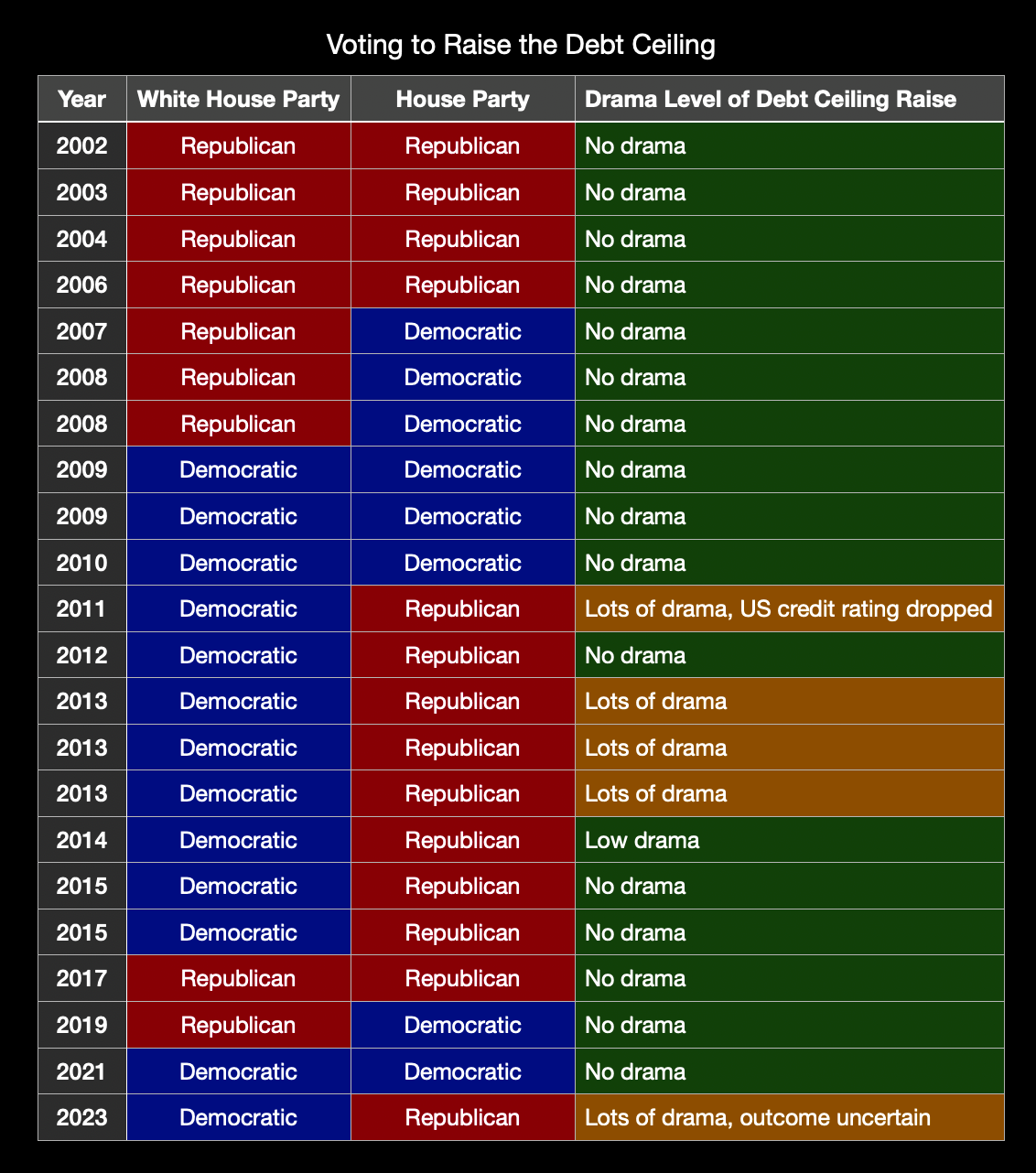Debt Ceiling Brinksmanship
Bob Runs the Numbers, Episode 11
The US debt ceiling is a pretty unique thing — very few other countries have something similar to our debt ceiling — and brings nothing to the strength of our country but provides plenty of opportunity for reckless bad-faith politicians to threaten the American economy. This sporadic brinksmanship — which never used to happen — is becoming more common in this millennium.
The Debt Ceiling Fight: WTF, Dude?
On the surface, what a bizarre concept: first, the House of Representatives votes to commit to spending money on something; then, some indefinite amount of time later, the House of Representatives votes to go ahead and keep paying what we promised to pay.
This sometimes turns into dangerous brinksmanship.
What “Normally” Happens
Raising the debt ceiling is usually a run-of-the-mill part of the business of running the country. It’s so tedious it historically hasn’t even been newsworthy. Let’s check out the last twenty-something years of debt ceiling raises.
It’s only recently, and with very specific balances of power, that there has been drama.
“Bu-bu-but Both Sides”
A lot of times, the “but both sides do it” argument is used to defend unpopular, unethical, illegal, or plain old stupid behavior.
A lot of times it’s even true! The process of building debt is certainly bipartisan! American debt grows nearly every year. (The only exception in the last several generations is a brief couple of years late in the Clinton administration.) It’s easy to eyeball debt growth with FRED’s surplus/deficit chart.
But back to debt ceiling fights. How partisan are these manufactured crises? These periodic votes to pay the debt we’ve already accrued? There’s nothing “but both sides” about ’em.
Let’s have another look at all the debt ceiling votes this millennium. Over a couple of decades we’ve had a healthy mix of Democrats and Republicans controlling the White House and the House of Representatives. What are the scenarios where the House of Representatives raises the drama level and engages in brinksmanship?
Hmmm. There’s one permutation that jumps out. A Democratic House of Representatives never jumps into debt ceiling brinksmanship. A Republican House quietly raises the debt ceiling when the White House is occupied by a fellow Republican. But if holding the American economy hostage has the chance of damaging a political opponent, the GOP is all in. (Actually they’re not all in. They’re six-eighths in. Bob Runs the Numbers is nothing if not precise about the amount of in-ness the GOP is.)
What If You Ran Your Household This Way?
The brinksmanship we’ve seen 75% of the time that there’s a GOP HoR with a Dem WH wouldn’t work for personal financial decisions. How weird that anyone thinks it’s OK for government!
If you get a mortgage from a bank and, years later, out of the blue, decide you will stop paying your mortgage payment unless the bank stops loaning to your neighbor, then congratulations: you understand the brinksmanship of debt ceiling fights (and might even be a House Republican).
What About the Constitution?
As we’ve seen in 2011 (and are seeing in 2023), these debt ceiling fights aren’t innocuous Beltway disputes. They threaten the US defaulting on its debt. Such a default would be pretty bad. (Nobody knows how bad because the House of Representatives has, so far, eventually come through. But it does seem that the more someone knows about the issue, the more terrible they think the outcome would be. To me that’s not great.) Even just the threat of default harms the US economy. Sowing doubt about American debt hurts America.
The Fourteenth Amendment of the United States Constitution offers some thoughts about our national debt.
“The validity of the public debt of the United States … shall not be questioned.”
We’ve got one party that is flouting the Fourteenth Amendment. Tap-dancing with defaulting on the US national debt unconstitutionally jeopardizes the strength of our Union.
“The validity of the public debt of the United States shall not be questioned” says the Constitution.
“Fuck that” say Republicans.




